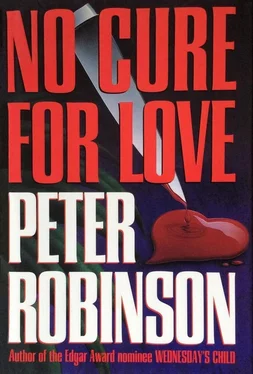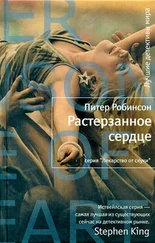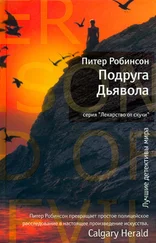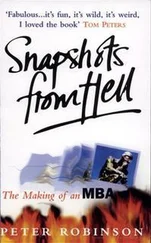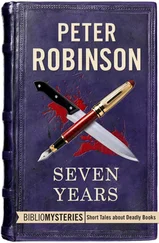A bitter wind blew off the North Sea. Bundled up in a shirt and sweater under her down jacket, a woolly hat, mittens and earmuffs, Sarah didn’t feel too cold. The sky was as gray as used dishwater, but now and then the clouds would break for a moment and a shaft of sunlight would shoot through and dance on the pewter sea, reminding her of the calm after a storm.
Behind her, the whitewashed, red-tiled cottages seemed piled on top of one another like children’s playing-bricks, huddled together in crooked, cobbled alleys higgledy-piggledy fashion. The village straggled down a steep hill to the sea in much the same way as the ones on the Greek islands that Sarah had visited with Gary. A small church perched on top of the cliffs, and even though it wasn’t Sunday, Sarah could hear children’s voices singing “Away in a Manger.”
She had forgotten how unusual the geology was around the bay. There wasn’t much sand, only the curved layers of dark, barnacle-encrusted rock, which looked like a slice through an enormous onion, or a giant scalloped seashell embedded in the shore. The grooves showed where the waves had eroded the older rocks more quickly than the bands of limestone and ironstone between them. It was a great place for fossil hunters, and it also created numerous rock-pools where Sarah stopped to watch tiny crabs scuttle beneath the pellucid water.
Out to sea, Sarah could see a ship with white sails flapping in the wind. She shivered, imagining what it would be like out on the North Sea today in a sailboat. She pulled her jacket more snugly round her neck and carried on walking. The wind whistled around her earmuffs.
When she arrived back at the harbor, she walked up the ramp to the street. It was just after noon. Instead of returning to the cottage, she decided to call at the pub where Paula worked and give her sister a surprise.
There weren’t many people in the public bar, but when Sarah walked in, what conversation there was stopped at once. Even the clack of dominoes ceased. The only sound came from a radio playing an old pop song somewhere in the back. Sarah recognized it: Susan Maugham singing “Bobby’s Girl.”
At first, the reaction she got reminded her of the opening scene of An American Werewolf in London, where the young tourists get lost in the Yorkshire Dales and go into an isolated pub to ask their way. She could see the grizzled, sea-leathered, wind-reddened faces trying to place her. She smiled and said hello to everyone, then walked toward the bar.
Paula came through from the lounge and said, “Sal! So you’ve finally decided to grace us with your presence, after all?”
“I thought I’d drop by for a quick one, yes,” said Sarah, taking off her mittens and rubbing her hands. “It’s cold out there.”
“Not half as cold as it will be in a day or two, lass,” said one of the drinkers behind her. Then they all laughed.
“This is my sister, Sally,” Paula said to all and sundry. “You know, the famous actress. Calls herself Sarah Broughton now.” She tilted her head, put a finger to the tip of her nose and turned it up.
They all nodded shyly and said how d’you do, then went back to their dominoes and muffled conversations. Sarah doubted if any of them watched her show on television. Besides, she was getting sick of this star business Paula kept going on about. She wasn’t a star; she was a supporting actress on a network drama.
Still, she supposed that in a village like Robin Hood’s Bay, she would have to accept that she was a star.
She unzipped her jacket and sat on a stool at the bar. It was a long time since she had been in a real English pub, and she took in the rows of unfamiliar bottles, the mirrors and brass rails. There were plenty of imitations in Los Angeles, but nothing quite like the real thing, with its bags of pork rinds and roasted salted peanuts, its upside-down bottles in the racks with optics attached, stone-flagged floor and roaring fire in the hearth.
“What’ll you have?” Paula asked. “Whatever it is, the first one’s on the house.”
“Thank you. I’ll have a whisky, please.”
“Good idea,” said Paula “Summat to warm the cockles of your heart.”
Paula handed her the glass and Sarah sipped. It burned all the way down her throat and spread a warm glow in her stomach.
She hadn’t been paying attention to the radio, but at that moment, Gary Knox came on singing “Blue Eyes, Black Heart,” his biggest commercial success and his least favorite song.
Sarah turned pale and almost dropped her glass.
When Paula realized what had happened, she went into the back. A few seconds later the song stopped and another station came on: an innocuous Whitney Houston number, this time.
“You didn’t have to do that,” Sarah said quietly to Paula when she came back. “But thank you.”
“Think nowt of it. Maybe one day you’ll tell me about him?”
Sarah managed a weak smile. “Maybe one day, yes.” She had heard only a snatch of the song, of Gary’s distinctive voice — like honeyed gravel, a poetic reviewer had once written — but it was enough to bring his image back to her mind’s eye.
Tall, thin, stooped, dark-haired and hollow-cheeked, with a lock of hair constantly falling over his right eye and a distant, crooked smile, he had always looked the way she imagined one of the Romantic poets might look after he had been up all night grappling with a particularly recalcitrant sonnet and a bottle of laudanum. Young Coleridge, perhaps, with feverish opium eyes and mussed-up hair, and that distracted look, as if he were hearing and seeing things no one else could. And, like many a Romantic poet, Gary had died young.
She had tried to imagine Gary’s death many times, how he had faced it. Many of his songs were about death; it was a subject he had thought intensely about since adolescence. She had recognized a kind of death-wish in much of his drug use and recklessness, a sort of cocking one’s hat against the grim reaper and saying, come on, catch me if you can.
As far as Sarah had heard, Gary had simply dropped dead on La Brea after leaving a nightclub with a group of friends. The autopsy had revealed a lethal mixture of cocaine, ecstasy, heroin, LSD, alcohol and barbiturates. His heart had, quite literally, just stopped beating. Had he had time in the moment of his death to savor the experience that had fascinated him so much in his life? Sarah didn’t know, and never would.
Their life together was still something of a blur. Of course, she remembered the early days: the party where they met in Camden Town, and how they walked the quiet London streets all night talking; the sunny idyll on the Greek island of Santorini, all vivid blues and whites, when Gary was writing the songs for what was to be his last album; the frustrations of studio work; the tour.
It was crazy from the start. Pushed by the record company to promote the new album when he was still exhausted from its creation and production, Gary set out for a mammoth US and Canadian tour with the band. Sarah went along for the ride.
And what a ride it was.
She could only remember patches of the chaos: backstage arguments, smelly tour buses, short, gut-churning air hops. New York, Boston, Philadelphia, Pittsburgh, Montreal, Toronto, Chicago. The names sped by and meant nothing; she saw nothing but hotel rooms and concert halls. Half the time she didn’t even know whether she was in the USA or Canada.
Gary was too sick from drugs to perform in Omaha, and he collapsed onstage in Dallas. The fans loved it. After only a couple of days’ rest, the band hit the West Coast and life became a nonstop party tinged with mayhem and madness. Vancouver, Seattle, Portland, San Francisco, Los Angeles, San Diego, picking up groupies and hangers-on all the way like a snowball picked up snow going down a hill. The further south they got, the more Sarah’s memory started to fail her.
Читать дальше
